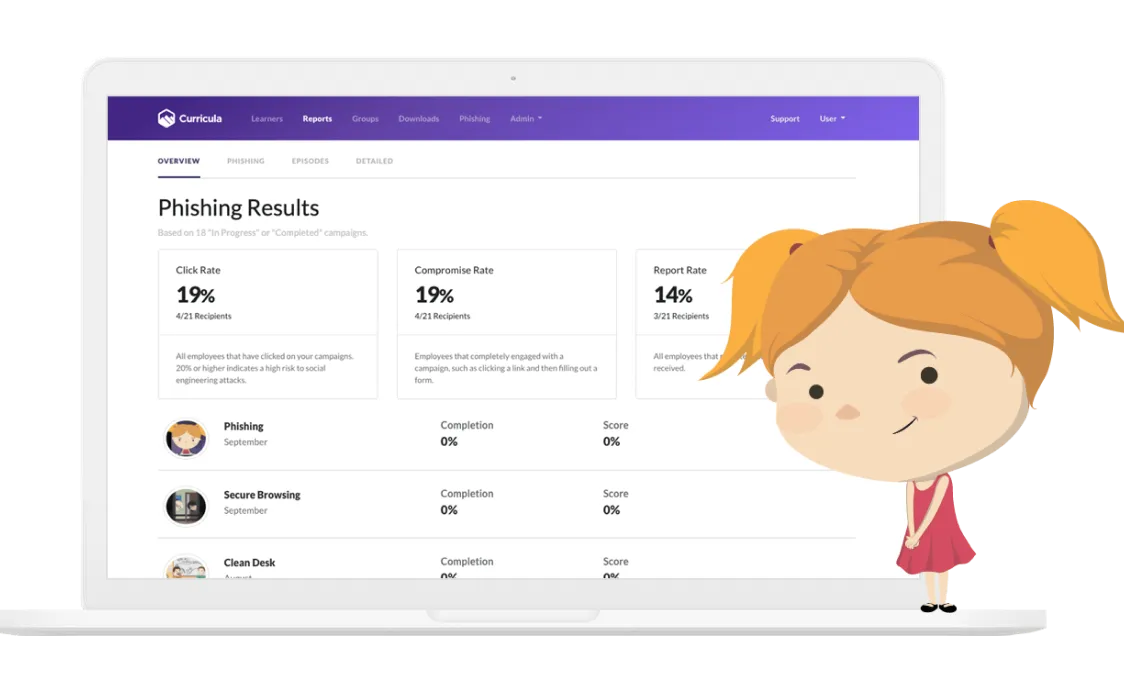In today’s IT landscape, awareness of security-related issues is critical to safeguarding your business. Despite the dazzling array of cybersecurity technologies available, your employees are still your first line of defense. Many organizations don’t realize the importance of encouraging employees to report potential cyber threats as soon as they become aware of them – this is where cybersecurity awareness training (CSAT) comes in.
With the advent of predictive and AI-driven threat detection tools, it’s easy to assume your business is well-protected. However, no technology can fully replace a well-trained team. Your staff are positioned to spot and report problems on the front-lines, making them irreplaceable in your overall cybersecurity strategy.
Consider this scenario: One of your employees receives an email that looks like it’s from a trusted supplier. Except it isn’t – this is a classic phishing attempt, where cyber criminals pose as legitimate entities to steal sensitive information. If the employee ignores the email or assumes someone else will deal with it, this could lead to a significant data breach, costing your company substantial resources and potentially damaging your reputation.
Low Reporting Rates: A Cause for Concern
Alarmingly, less than 10% of employees report phishing emails to their IT security teams. This statistic highlights a significant vulnerability in many organizations. But why is this the case?
- Lack of Awareness: Employees may not understand the importance of reporting security threats.
- Fear of Repercussions: They might be afraid of being reprimanded if they report something incorrectly.
- Perception of Responsibility: Some may think it’s not their job to report security issues.
- Past Experiences: If employees have been criticized for previous security mistakes, they may be hesitant to report new ones.
The Importance of Education
One of the primary reasons for the low reporting rates is a lack of understanding among employees about what constitutes a security threat and why reporting it is crucial. Education is vital, but it needs to be engaging and accessible, not laden with technical jargon.
Cybersecurity awareness training should be interactive and relatable, using real-life examples and scenarios to illustrate how a minor issue can escalate into a major problem if left unreported. Simulating phishing attacks can help demonstrate the potential consequences and underscore the importance of vigilance. When employees see the direct impact of their actions in preventing disasters, they are more likely to take reporting seriously.

Leap Cloud Solutions is proudly partnered with Curricula by Huntress to provide our small business clients with industry-leading cybersecurity training in the form of fun, interactive and engaging activities for staff. If this is something you need help with, get in touch. Image credit: Huntress Labs
Simplifying the Reporting Process
Even when employees are willing to report issues, a complicated reporting process can deter them. It’s essential to streamline this process, making it as straightforward as possible. Easy-access buttons or quick links on the company’s internal portal can facilitate immediate reporting.
Regular reminders and clear instructions on how to report cybersecurity incidents are also crucial. When someone reports a security concern, providing immediate feedback, such as a thank you or acknowledgment, can reinforce positive behavior and demonstrate that their efforts are valued.
Fostering a Positive Reporting Culture
Creating a culture where reporting security issues is encouraged and appreciated is vital. If employees fear judgment or punishment, they are less likely to speak up. Leaders must set the tone by openly discussing their own experiences with reporting issues. When senior executives are transparent about security, it encourages everyone else to follow suit.
Appointing security champions within various departments can also help. These individuals serve as points of contact for their peers, offering support and making the reporting process less intimidating. Keeping security a regular topic of conversation helps maintain awareness and vigilance.
Celebrating Success and Learning from Mistakes
It’s important to celebrate the learning opportunities that arise from reported incidents. Sharing success stories where reporting helped avert a crisis can educate and motivate your team. This not only fosters a proactive security culture but also ensures that everyone understands the critical role they play in keeping the company safe.
Conclusion
By making it easy and rewarding for employees to report security issues, you not only protect your business but also build a more engaged and proactive workforce. Encourage open communication, continuous learning, and avoid shaming anyone for their mistakes. Promptly reported issues are easier and cheaper to resolve, ensuring the continued security and success of your business.
If you need assistance in implementing cybersecurity awareness training for your business, we are here to help. Contact us to learn more about how we can support your business in fostering a robust security culture.
Frequently Asked Questions (FAQs)
Many employees may not realize the significance of reporting security threats. By incorporating comprehensive education and training programs, you can encourage staff to look for potential threats and foster a positive work environment while doing so.
Implementing easy-access buttons or quick links on your company’s intranet and providing clear instructions can make the cybersecurity reporting process straightforward and less daunting for your team.
Cybersecurity is an “everyone” game. Leaders should set an example by openly discussing their own experiences with reporting issues. Appointing security champions and making security a regular conversation topic can also help get everyone onboard.
Using real-life examples and scenarios on the impact of cyber attacks during training, providing immediate feedback, and sharing success stories can help motivate employees to report security concerns as soon as they spot them.
Employees might fear getting into trouble, not realize the importance, think it’s someone else’s responsibility, or have had negative experiences with reporting in the past. Working with your team to address these common concerns can help build a culture where cybersecurity issues are addressed before they do serious damage.
Security champions serve as go-to contacts within departments, providing support and making the reporting process less intimidating for their peers.



